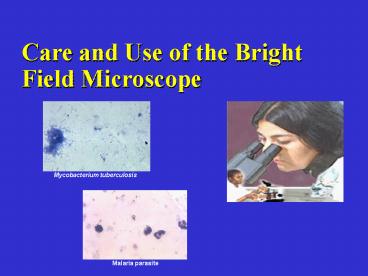Care and Use of the Bright Field Microscope - PowerPoint PPT Presentation
1 / 17
Title:
Care and Use of the Bright Field Microscope
Description:
Regular cleaning of oculars and objectives ... Cleaning the Microscope. Routine Cleaning Supplies: Commercial lens tissue for optics ... – PowerPoint PPT presentation
Number of Views:160
Avg rating:3.0/5.0
Title: Care and Use of the Bright Field Microscope
1
Care and Use of the Bright Field Microscope
Mycobacterium tuberculosis
Malaria parasite
2
Importance of the Microscope
- Important for hematology, microbiology, TB, and
malaria testing - Compound microscope used in bacteriology,
biology, and medicine to examine minute objects
such as bacteria, other unicellular organisms,
and plant and animal cells and tissue - Advances in fluorochrome stains and monoclonal
antibody techniques caused growth in use of
fluorescence microscopy in both biomedical
analysis and cell biology
3
Basic Components of the Microscopeand their
functions...
Course and fine adjustments knobs
Eyepiece lens
Objectives
Stage
Stage motion control knobs
Condenser
Power switch
Aperture diaphragm
Light intensity control
Field diaphragm ring
4
Care and Maintenance of the Microscope
- Good preventive maintenance and care includes
- Regular cleaning of oculars and objectives
- Avoid damaging oculars and other optics with eye
make-up or other debris - Careful handling to avoid abrupt motions
- Protect from direct sunlight, high temperature,
humidity, dust and vibration - Use appropriate materials to clean the lenses
- Cover when not in use with vinyl or plastic dust
cover
5
Cleaning the Microscope
- Routine Cleaning Supplies
- Commercial lens tissue for optics
- Caution Do not use paper towels or other rough
paper products - Cotton swabs with wooden shaft (optics)
- 70 isopropyl alcohol
- Dilute methanol is satisfactory
- Mild detergent and soft cloth for stage and base
of microscope
6
Cleaning Oculars and Objectives
- Unplug the microscope
- Wash hands
- Remove dust from optical glass surfaces
- Carefully remove eyepieces, objectives,
condenser, and filtersone at a time - Excessive rubbing can cause damage to iridescent
coating on lens - Clean and replace as completed
- Do Not take eyepiece or objectives apart
7
Replacing Microscope Bulb
- Unplug microscope and allow bulb to cool
- Carefully place microscope on its side
- Open bulb house use tissue to remove bulb
- Use tissue (to avoid fingerprints) to pick up new
bulb - Insert new bulb and close bulb house
8
Setting the Koehler Illumination
- Plug in microscope and turn on illuminator.
Rotate nosepiece to lock 10X objective in place - Place smear on stage and center it under the 10X
objective - Open the field diaphragm all the way and close
condenser diaphragm all the way - Move up (rack up) stage to its highest position
- Adjust the oculars for interpupillary distance so
that only one circle of light is seen - Rack up condenser as high as possible
9
Setting the Koehler Illumination (continued)
- Close field diaphragm half way and focus smear at
10X - Close field diaphragm until diameter of
illuminated image is smaller than the field of
view - Lower condenser with positioning knob until you
have a sharp, focused image of the edges of the
field diaphragm - Adjust condenser using centering screws so that
the circle of light is centered in field - Open field diaphragm until illuminated image is
just larger than the field of view. If more
light is needed, use the transformer. - Koehler illumination is now set. It is important
not to move the condenser up or down or change
the field diaphragm.
10
Operation of the Microscope Examining Smears
- Put smear on stage and center it under the 10X
objective - Adjust intensity of the light to a comfortable
level with the transformer - Open condenser diaphragm about 70 to achieve a
good balance of resolution and contrast - Adjust oculars for interpupillary distance so
that when looking with both eyes only one circle
of light is seen
11
Examining Smears (continued)
- Adjust sharpness of image by moving adjustment
ring on adjustable ocular - Once 10X focus is achieved, rotate nosepiece so
that the 40X objective is in place - Readjust the intensity of light to a comfortable
level using the transformer - Use the fine adjustment knob to focus up and down
through the different planes of the field
12
Microscope Problems Troubleshooting 1
- Problem Black Field
- Possible Causes
- Microscope not plugged in
- Power not available at outlet
- Illuminator not turned on
- Bulb burned out
- Objective not clicked into place
- Condenser too low with diaphragms closed
13
Microscope Problems Troubleshooting 2
- Problem Field only partially illuminated
- Possible Causes
- Objective not clicked into position
- Condenser not centered correctly
- Condenser too low
- Field diaphragms closed too much
14
Microscope Problems Troubleshooting 3
- Problem Difficulty focusing with 10X
- objective
- Possible Causes
- Wrong objective in place
- Objective not screwed into place
- Not in correct plane of focus
15
Microscope Problems Troubleshooting 4
- Problem Difficulty focusing with 40X
- objective
- Possible Causes
- Not in correct plane of focus
- Not initially focused at 10X
16
Microscope Problems Troubleshooting 5
- Problem Blurry image at 10X or 40X
- Possible Causes
- Dirty objective
- Dirty slide
- Dirty coverslip
- Problem Ground glass appearance
- Possible Causes
- Condenser too high
17
Credits
Thanks to STD/HIV Prevention Training Center of
New England in Collaboration with State
Laboratory Institute and National Laboratory
Training Network, CDC































